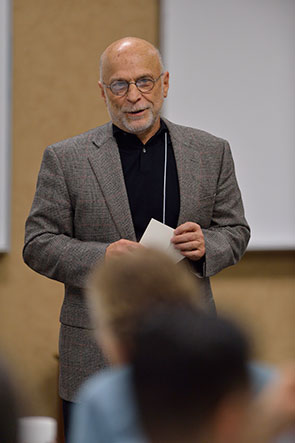
Terry Muck is Executive Director of the Louisville Institute and will present on Death and Dying at the upcoming Louisville Fellows June Consultation.
LI: Why is death and dying an issue for the church right now?
TM: Well, of course, it has always been an issue for the church. Everybody dies, and the church has always dealt with it one way or another. Several factors, however, make it a topic of special interest right now.
LI: What factors?
TM: One is demographic. People live longer these days. And, coupled with the baby boomer birth rate, the percentage of older people has increased dramatically. In North America in 1790, people over the age of 65 made up just 2% of the population; today they make up 14%. And over the next few decades that percentage will continue to grow.
The other is cultural. In just the last half century, death has gone from being a topic of mainly philosophical/theological discussion to a question of how to better care for the dying—and how to die well.
If you mentioned the word “funeral” a hundred years ago – before penicillin – in most cultures people would imagine a baby or child. While that’s still the case in some places today, in modern society the word “funeral” now conjures an older adult. As older adults are moving into assisted living facilities and nursing homes, the rest of us don’t experience the aging and dying process on a daily basis. Even though our social imaginary is saturated with virtual death via contemporary media — TV, movies, Internet, video games – physical death remains distant and “sanitized’ for most of us in our day-to-day lives.
LI: How has the church responded to these cultural shifts?
TM: Congregations are one of the few places in our society where death is openly acknowledged and for the most part dealt with. But even the church has to guard against being overly influenced by three cultural trends vis-à-vis death: obfuscation, medicalization, and abdication.
LI: Obfuscation?
TM: Obfuscation means the temptation to buy into the cultural trend of philosophical analysis when it comes to discussing death and avoiding talk about individual cases of death and dying. Straight talk about death in our culture is rare. Let’s make sure the church doesn’t fall into that trap.
LI: Medicalization is a good thing, right?
TM: Up to a point. Medical advances enable people to live longer and better lives these days. But that comes with a theological price tag. In medical terms, death is the enemy, to be avoided at all costs; in theological terms, mortality is part of being human and Christ’s death and resurrection means even mortality has been defeated: “O death, where is thy sting? O grave, where is thy victory?” (I Cor. 15:55)
LI: And abdication?
TM: The church cannot afford to abdicate its spiritual role in dealing with death and dying among parishioners, leaving it to doctors and hospitals to have the final say as people come to the end of their lives.
LI: Can you give an example of that?
TM: Sure. The fact that the percentage of people who die in hospitals as opposed to home has increased so dramatically, indicates that the determination of the terms of our deaths has shifted from a place that places greatest value on the relational and spiritual (our homes) to a place that places the greatest value on sheer survival (the hospital).
LI: How have Louisville Institute pastors and scholars dealt with this topic in their research?
TM: They have been strongest in mining scriptural and theological resources for information on the Christian understanding of death and dying. And they have also weighed in on topics like assisted dying, liturgical approaches to death and dying, the funeral industry in America, the Eucharist and death, and pastoral care of the dying.
LI: What new resources are available?
TM: An increasing number of very good resources are available. A few for consideration would include:
- Thomas Long, Accompany Them With Singing: The Christian Funeral (WJK, 2009)
- Rob Moll, The Art of Dying (IVP, 2010)
- Living Well and Dying Faithfully, John Swinton and Richard Payne, editors (Eerdmans, 2009)
- Allen Verhey, The Christian Art of Dying: Learning From Jesus (Eerdmans, 2011)
- Also, consider a secular resource from a physician, Atul Gawande, Being Mortal (Holt, 2014)
LI: Are there common areas of agreement, recommendations for what the church should do, in these more recent resources?
TM: Yes, I think that some very good trends are emerging, including productive ways of looking at the inevitable choices among hospitalization, hospice, and homecare. A few of the recommendations might be:
Tell the truth. As a general rule, keep in mind that better choices are made when better facts are available. A dying person can’t choose among healthcare options if he or she does not really know what is going on.
Assert a more theological prioritization regarding life, dying, death, and afterlife. Cultural trends do not always mesh well with theological truth. The church’s role is to speak for the latter.
Better utilize liturgical and worship resources. There is often under-utilized power in the liturgies and worship resources of the church. Learn to use them effectively.
Focus pastorally on balancing the provision of good information and advice with the patient/parishioner’s freedom to choose. Wise pastors, in consultation with wise doctors, have an important role to play in recommending good, better, and best options. This is no time for a non-committal Rogerianism. But wise patients must realize that in the end, they must choose what kind of care will provide the best kind of life and death for them and their families.